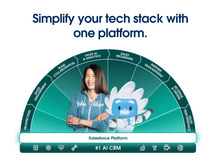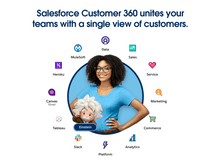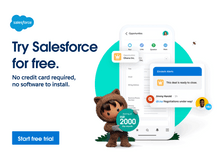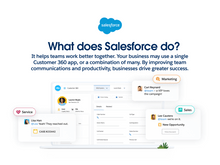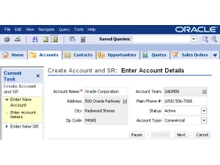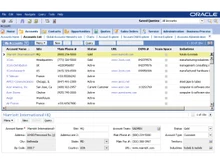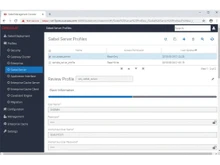Siebel CRM and Salesforce CRM are two popular customer relationship management (CRM) solutions that offer similar features and functionalities. However, Siebel CRM is more complex and geared toward large enterprises, while Salesforce CRM is more user-friendly and scalable for small to medium-sized businesses. Siebel CRM provides advanced sales, marketing, and customer service capabilities, while Salesforce CRM offers a lower total cost of ownership and more customizable interfaces.
Here, we will analyze key differences between Siebel CRM and Salesforce CRM based on features, customer support, pricing, supported devices, user interface, and more.
Siebel vs Salesforce: An Overview
Siebel CRM is customer relationship management software that provides a comprehensive suite of tools for managing sales, marketing, and customer service activities. It offers certain crucial features like sales forecasting, lead management, contacts management, opportunity management, and customer self-service portals. Siebel CRM is designed to help businesses streamline their sales and marketing processes, improve customer engagement, and increase revenue.
Salesforce CRM (Customer Relationship Management) is a cloud-based platform used for managing customer interactions and data. It provides a wide range of functionalities including contact management, lead management, analytics, marketing automation, and more. With Salesforce CRM, businesses can streamline their sales, marketing, and customer service processes, while improving efficiency and customer satisfaction.
Siebel vs Salesforce: Key Differences
The major differences between Siebel CRM and Salesforce CRM are as follows:
- Siebel CRM and other Siebel alternatives are customizable and offer more flexibility in terms of configuration and modification compared to Salesforce CRM.
- Siebel CRM has better integration capabilities with other systems and applications, while Salesforce CRM has stronger integration with other Salesforce products and services.
- In comparison to Siebel CRM, Salesforce CRM and other Salesforce alternatives are designed to scale better and handle larger volumes of data and users, making it a better choice for larger organizations.
- Salesforce CRM is more expensive than Siebel CRM.
Siebel CRM vs. Salesforce CRM: In Terms of Features
- Engine: Oracle Siebel CRM is based on the business process engine while Salesforce CRM is based on the process-oriented workflow engine.
- Infrastructure: Siebel CRM requires manual labor and regular server upgrades for the infrastructure. In contrast, Salesforce CRM focuses on business rather than infrastructure and provides automatic updates. It releases three software upgrades annually, focusing on innovation, technology, and mobility. It also ensures scalability and ease of use.
- Deployment and Compatibility: Siebel CRM cannot be deployed in the cloud environment. On the other hand, Salesforce CRM can be deployed as cloud software and is compatible with various operating systems and platforms.
- Real-Time Available Information: Siebel CRM does not provide real-time information and requires a separate data warehouse. Whereas, Salesforce CRM provides real-time data access via web, email, and mobile devices, eliminating the need for separate data warehouses.
- Account and Permission Management: Siebel CRM requires dedicated staff and manual processes to manage account governance, user roles, and permissions. Salesforce CRM, on the other hand, offers unified security and data permissions management, simplifying the account and permission management process.
- Integration: Siebel CRM offers easy integration with a variety of software packages. On the contrary, Salesforce CRM has fewer integration options and requires enterprise versions for seamless integration with third-party software.
Siebel vs Salesforce: Pricing
Salesforce has lower initial costs (over a period of five years), but it can become more expensive as it operates on a subscription-based model. On the other hand, Siebel requires an upfront investment in servers and licenses, but it ends up being more cost-effective compared to continued subscription payments for Salesforce. Siebel offers more options and functionalities, including self-service, e-service, and marketing management within its platform, eliminating the need to rely on multiple vendors.
Siebel vs Salesforce: Supported Devices
Oracle Siebel CRM is supported on Windows, Android, iPhone, and Mac. On the other hand, Salesforce CRM is supported on Windows, Linux, Android, iPhone, and Mac.
Siebel CRM vs. Salesforce CRM: Customer Support
Oracle Siebel CRM offers customer support via email, live support, phone, training, and tickets. Salesforce CRM, on the other hand, provides support via email, phone, training, and tickets only.
Siebel CRM vs. Salesforce CRM: Development and Maintenance
Siebel CRM uses a specialized development language, called Siebel eScript which takes a lot of time and leads to difficulties with logic building and upgrades. On the other hand, Salesforce CRM uses a simple point-and-click approach for fast development and provides a strong API and additional solutions that make customization and maintenance easier.
Siebel vs Salesforce: User Interface
Siebel CRM isn’t great with maintaining wireless devices and its user interface isn't easy to use. In contrast, Salesforce CRM supports web-based, cross-platform, and mobile applications, providing an intuitive and accessible user interface.
Siebel CRM vs. Salesforce CRM: Mobile Access
Siebel CRM provides mobile customer relationship management with an additional cost per user for mobile access. Salesforce CRM, on the other hand, offers mobile apps for various devices and integrates with developer apps for iPhone, BlackBerry, as well as Android.
Verdict: Siebel vs Salesforce
In summary, Siebel CRM and Salesforce CRM are two popular CRM solutions with distinct features and benefits. Siebel CRM caters to large enterprises, offering advanced capabilities and superior integration options. On the other hand, Salesforce CRM is user-friendly, scalable for small to medium-sized businesses, and has a lower overall cost. Siebel requires manual server upgrades, while Salesforce provides automatic updates and cloud deployment. Salesforce CRM offers real-time data access and unified security, simplifying permission management. Additionally, Salesforce CRM has better mobile access and integration with developer apps.


 91 Ratings & 79 Reviews
91 Ratings & 79 Reviews





